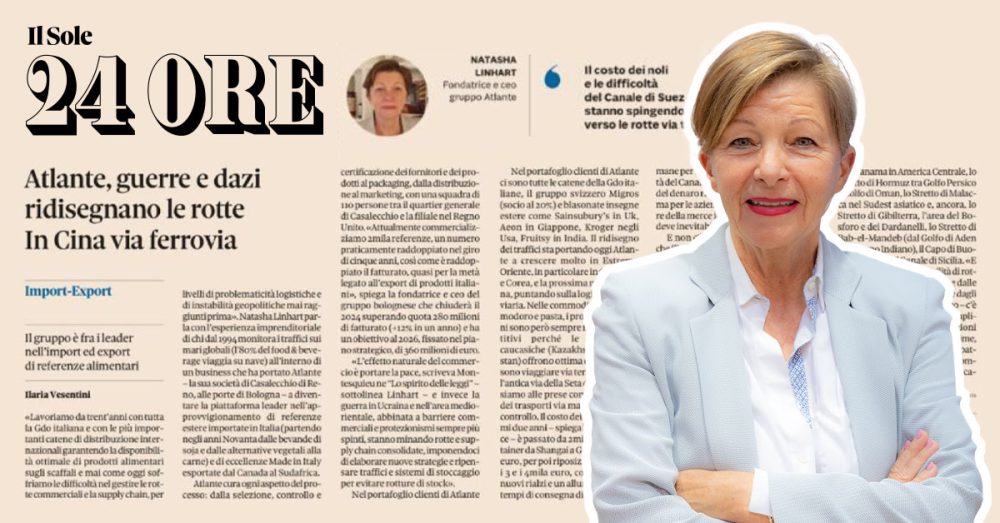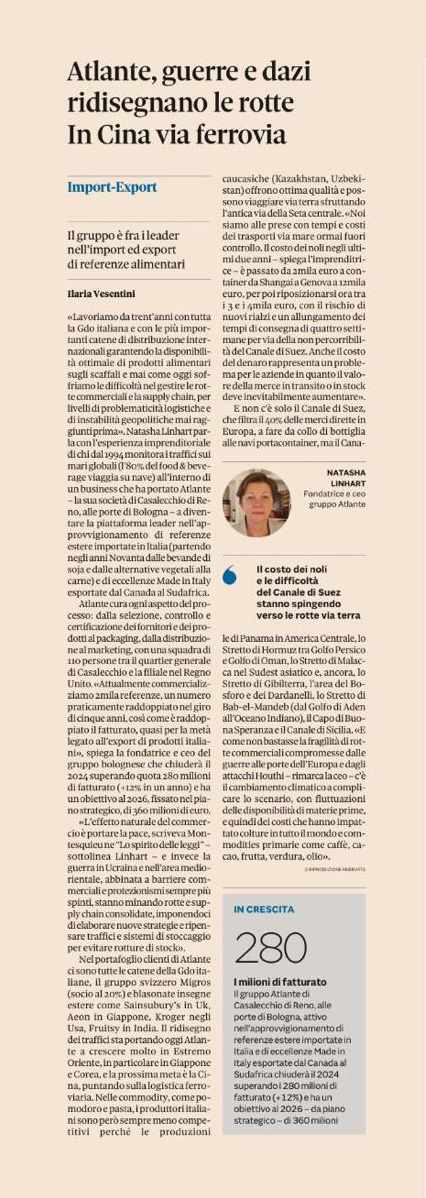Atlante
News
Atlante: A Journey of Growth and Innovation in Global Trade

7 January 2025
An in-depth article in Il Sole 24 Ore explores Atlante’s remarkable growth journey and the challenges it faces in ensuring a seamless supply of food products in Italy, while championing the export of Made in Italy excellence to markets around the world.
The piece underscores Atlante’s dedication to tackling the logistical and geopolitical complexities that define global trade today — from conflicts and rising protectionism to the far-reaching impacts of climate change. Under the strategic leadership of founder and CEO Natasha Linhart, Atlante is reimagining trade routes to sustain its growth in an ever-evolving market landscape.
With a strong commitment to innovation and an unrelenting focus on quality, Atlante is on track to close 2024 with revenues surpassing €280 million, setting its sights on an ambitious target of €360 million by 2026.
Atlante: How wars and tariffs are redrawing trade routes – China’s rail opportunity
Il Sole 24 ore, 07/01/2025
Ilaria Vesentini

“For thirty years, we have collaborated with the entire Italian GDO sector and the most prominent international retail chains, ensuring food products are always available on shelves. Yet today, we face unprecedented challenges in managing trade routes and supply chains, with logistical complexities and geopolitical instability reaching levels never seen before.”
These are the words of Natasha Linhart, founder and CEO of Atlante, who has been navigating global maritime traffic since 1994. With 80% of food and beverage products transported by sea, this sector forms the backbone of Atlante’s operations. Based in Casalecchio di Reno near Bologna, Atlante has become a leading platform for sourcing international products for the Italian market and exporting Made in Italy excellence to markets worldwide, including Canada and South Africa. Beginning in the 1990s with soy-based beverages and plant-based meat alternatives, the company has evolved into a significant player in global trade.
Atlante manages every aspect of the supply chain, from selecting and certifying suppliers to quality control, packaging, distribution, and marketing. Its 200-strong team, spread between its Casalecchio headquarters and its UK branch, drives these comprehensive operations.
“We currently manage 2,000 product references — nearly double the number we handled five years ago — and our turnover has also doubled, with almost half tied to the export of Italian products,” Linhart explains. The company is on track to close 2024 with revenues exceeding €280 million, marking a 12% year-on-year growth, and has set a bold target of €360 million by 2026 as part of its strategic plan.
Citing Montesquieu, Linhart reflects, “The natural effect of commerce is to bring peace, as written in The Spirit of the Laws. Yet today, the war in Ukraine, conflicts in the Middle East, increasing trade barriers, and rising protectionism are destabilising long-established trade routes and supply chains. These disruptions compel us to rethink logistics, adopt new strategies, and improve storage systems to avoid stock shortages.”
Atlante’s portfolio includes major Italian GDO chains, Swiss retailer Migros (a 20% shareholder), and international leaders such as Sainsbury’s in the UK, Aeon in Japan, Kroger in the USA, and Fruitsy in India.
As trade routes are being redefined, Atlante is focusing on growth in the Far East, particularly in Japan and Korea, while targeting China as its next destination by leveraging rail logistics as a competitive advantage.
In commodities like tomatoes and pasta, Italian producers are facing increased competition from Caucasian countries such as Kazakhstan and Uzbekistan. These regions offer high-quality goods that can be transported overland via the ancient Central Silk Road, a route that is becoming increasingly viable.
“Maritime transport costs and timelines are becoming increasingly unmanageable,” Linhart explains. “In the past two years, the cost of shipping a container from Shanghai to Genoa has skyrocketed from €2,000 to €12,000, before settling between €3,000 and €4,000. However, risks of further price hikes remain, and delivery times have extended by four weeks due to the limited accessibility of the Suez Canal. On top of this, rising financing costs add further strain, as the value of goods in transit or storage inevitably increases.”
The challenges extend beyond the Suez Canal, which processes 40% of Europe-bound goods. Other critical bottlenecks include the Panama Canal in Central America, the Strait of Hormuz in the Middle East, the Strait of Malacca in Southeast Asia, Gibraltar, the Bosporus and Dardanelles in Turkey, Bab-el-Mandeb connecting the Gulf of Aden to the Indian Ocean, the Cape of Good Hope, and the Strait of Sicily.
“As if the fragility of trade routes affected by wars near Europe and Houthi attacks wasn’t enough, climate change further complicates the picture,” Linhart adds. “Fluctuations in raw material availability and costs have disrupted global crops, impacting essential commodities such as coffee, cocoa, fruit, vegetables, and oil.”
